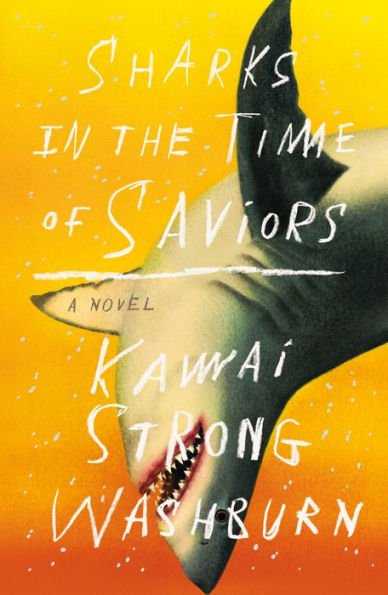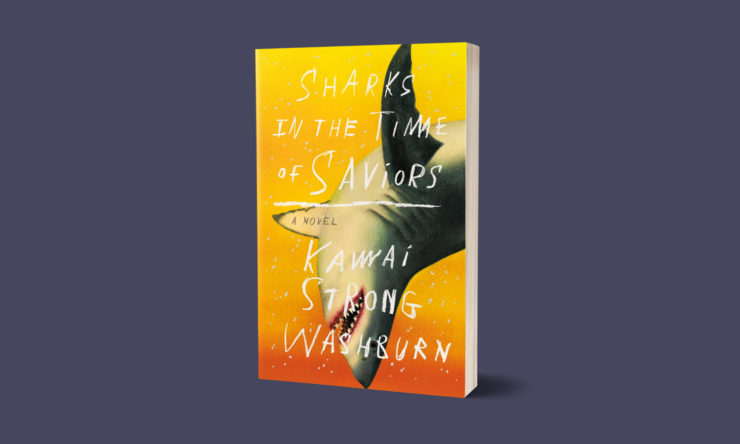Sharks in the Time of Saviors by Kawai Strong Washburn melds folklore and reality in a debut novel that straddles genres the way its characters straddle identity.
On the surface, the Flores family is ordinary in many ways: A young couple hot for each other, three kids, living paycheck to paycheck. Malia and Augie Flores are just trying to survive and provide. They are an avatar of working class Native Hawaiian people, living on their ancestral lands but somehow still in the margins. But throughout the course of the novel, the Flores family becomes a legend. This is how a legend is born.
A little before the Flores family is forced to move from the Big Island to O’ahu to find work, they take a trip. “They deserve more than they get,” Augie Flores says to justify a tourist cruise. During the trimaran boat ride, the youngest son, Nainoa falls overboard. Just when he’s thought to be lost under the current, sharks arrive. Noa is returned to his mother in the mandible of a shark without a scratch on him. Blessed. Chosen. All things that are ascribed to Noa from that moment on. But his mother knows that his destiny was sealed before that, when mythic night marchers appear to Malia and Augie during Noa’s conception in the bed of their pickup truck. Their fortune changes a bit.
Suddenly, they’re on television. Noa becomes the shark boy, and the local celebrity allows him to get a full scholarship for Native Hawaiians to attend a private school. The miracle boy doesn’t stop there–one New Year’s Day, a freak accident leads to the discovery that Noa has the power to heal. From here the novel breaks into alternating points of view between Malia, Noa, Dean, Kaui over the course of fourteen years.
Buy the Book


Sharks in the Time of Saviors
Washburn succeeds at making every point of view distinct. Dean with his colloquial observations, and angst about being compared to his younger brother. Kaui, the youngest daughter running away from her family. Noa’s melancholy and existential dread about why he was chosen, and what happens when his powers fail. Malia’s heartbreaking reality about her family and the things she can’t control. Each of the Flores siblings struggles with the myth and miracles associated with their family. Dean and Kaui have an unshakeable anger, but it doesn’t always feel like jealousy toward Noa. Their anger has been inherited, passed down through decades of colonization and erasure, and causes them to struggle when they leave for the mainland to go to college. Kaui goes to study Engineering in San Diego, Noa takes his gifts for healing as an EMT in Portland, and Dean follows a basketball scholarship to Spokane. During these intervals, the siblings explore belief and identity.
Dean’s question, “How come if there’s gods, they’re not in all of us?” seems to hang over, not just the Flores family, but everything they represent. Dean is a frustratingly tragic figure. Always in his little brother’s shadow, he does everything he can. His skill with basketball feels like a gods-given gift, until it’s gone and drops out of college to become a delivery man. Meanwhile Kaui struggles with her ability to fit in, and her sexuality, a thread that doesn’t have a satisfying resolution. But Washburn writes reality as it is—messy and painful—and not as we want it to be—idealistic. There is a physical longing for Hawai’i when the siblings are on the mainland, but it’s Noa who answers the call to return, which is when everyone else follows.
Those picking up the novel with expectations of more genre elements will be disappointed as the magic is more spiritual and the plot is subtle and character driven. Sharks in the Time of Saviors does present miracles and legends, but whether they’re true or not is left up to the reader because belief is a major theme of the novel. Did Noa really heal all those people? Was he really blessed by the ancient Hawaiian gods? What really happened to Noa?
Some readers will find it jarring to follow a tender moment of kissing followed by a defecating scene. There are moments where a beautiful line will be followed up with talk of body fluids and “stinky breath.” While startling and a bit gross, Washburn doesn’t shy away from truth. Where Sharks in the Time of Saviors does thrive is the gorgeous, honest prose. Ideas of the past are pit against expectations of the future. A passage that lingers and encapsulates the themes of the novel is Dean’s thoughts right before he moves to Spokane. “Way I figure, before the first Hawaiians became Hawaiians, it was them back in Fiji or Tonga or wherever and they had too many wars with too many kings and some of the strongest looked at the stars and saw a map to a future they could take for themselves. Broke their backs making themselves canoes to cut through forty-foot swells and sails big enough to make a fist out of the wind and then they got free from their old land. Goodbye old kings goodbye old gods goodbye old laws goodbye old power goodbye limits.”
In Sharks in the Time of Saviors children try to escape the legacy of their parents and struggle. At the end of it all, the Flores siblings have no choice but to come home, to face hope and fear and belief. To face life and destiny. To grieve and heal.
Washburn asks “what is the ‘price of paradise’ and who gets to pay it?” all the while writing from an outsider’s point of view.
Sharks in the Time of Saviors is available from MCD.
Zoraida Córdova is the award-winning author of the Brooklyn Brujas series, The Vicious Deep trilogy, and Star Wars: A Crash of Fate. Her short fiction has appeared in the New York Times bestselling anthology Star Wars: From a Certain Point of View, and Toil & Trouble: 15 Tales of Women and Witchcraft. Zoraida was born in Ecuador and raised in Queens, New York. When she isn’t working on her next novel, she’s planning a new adventure.










